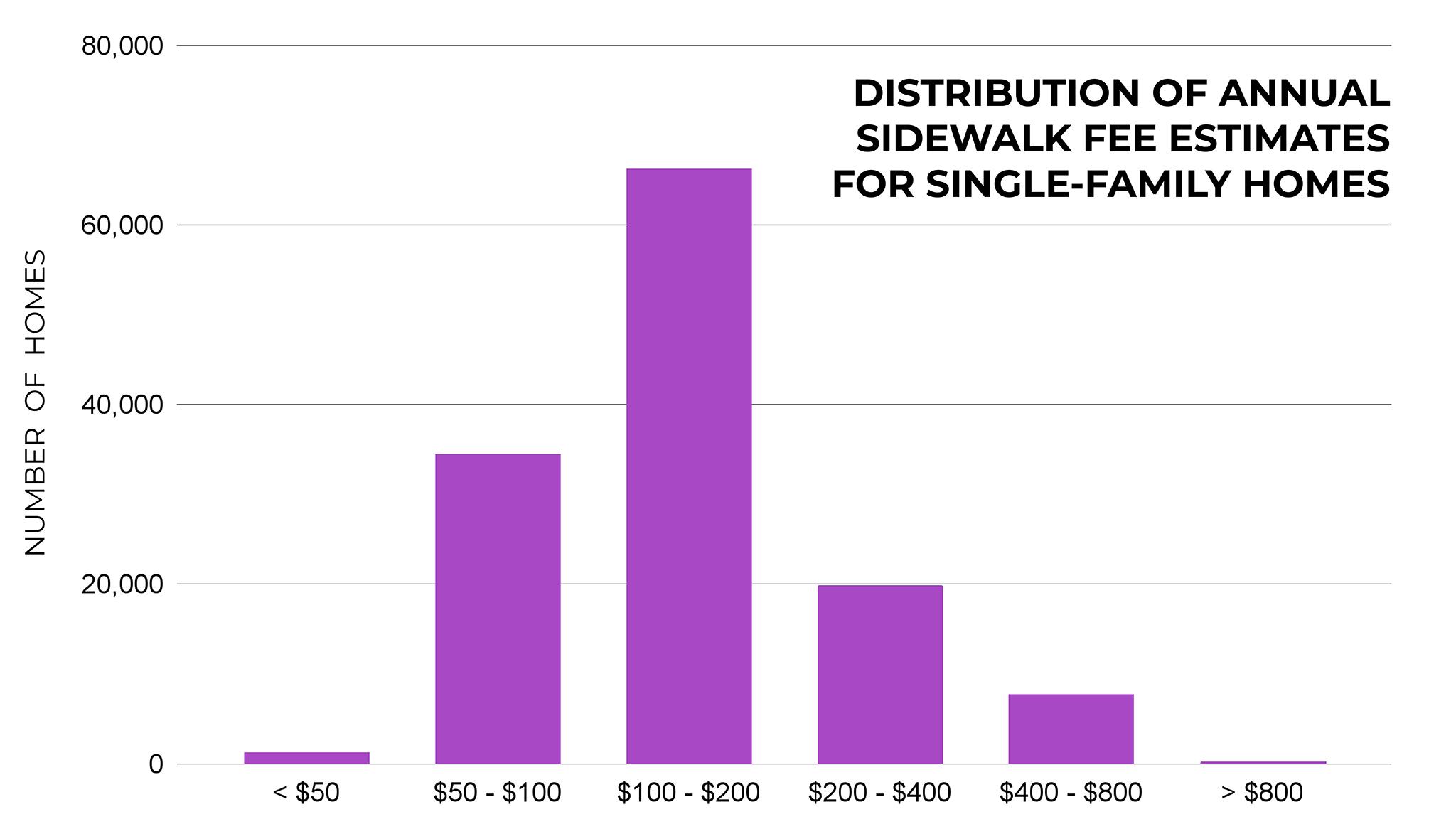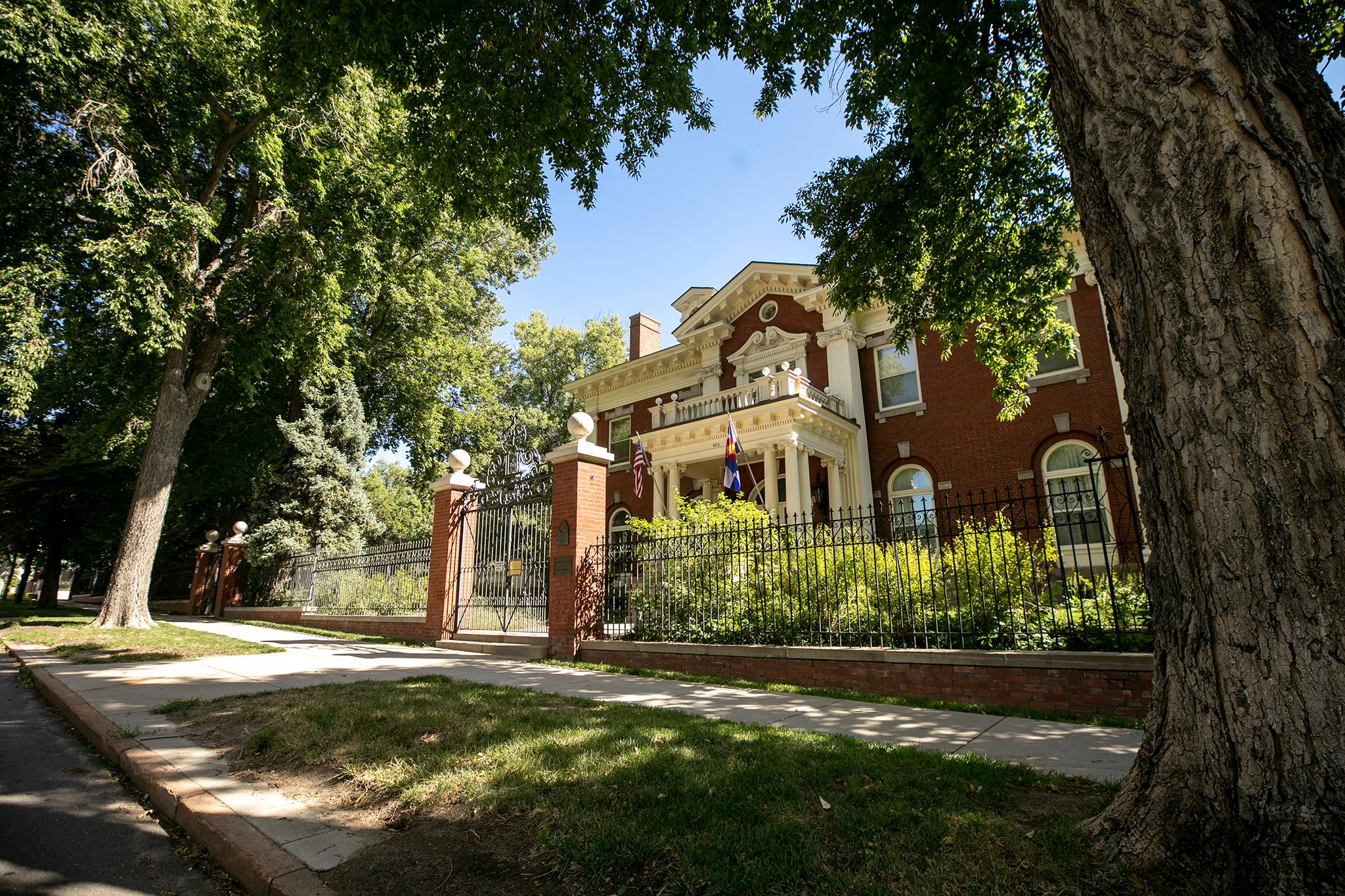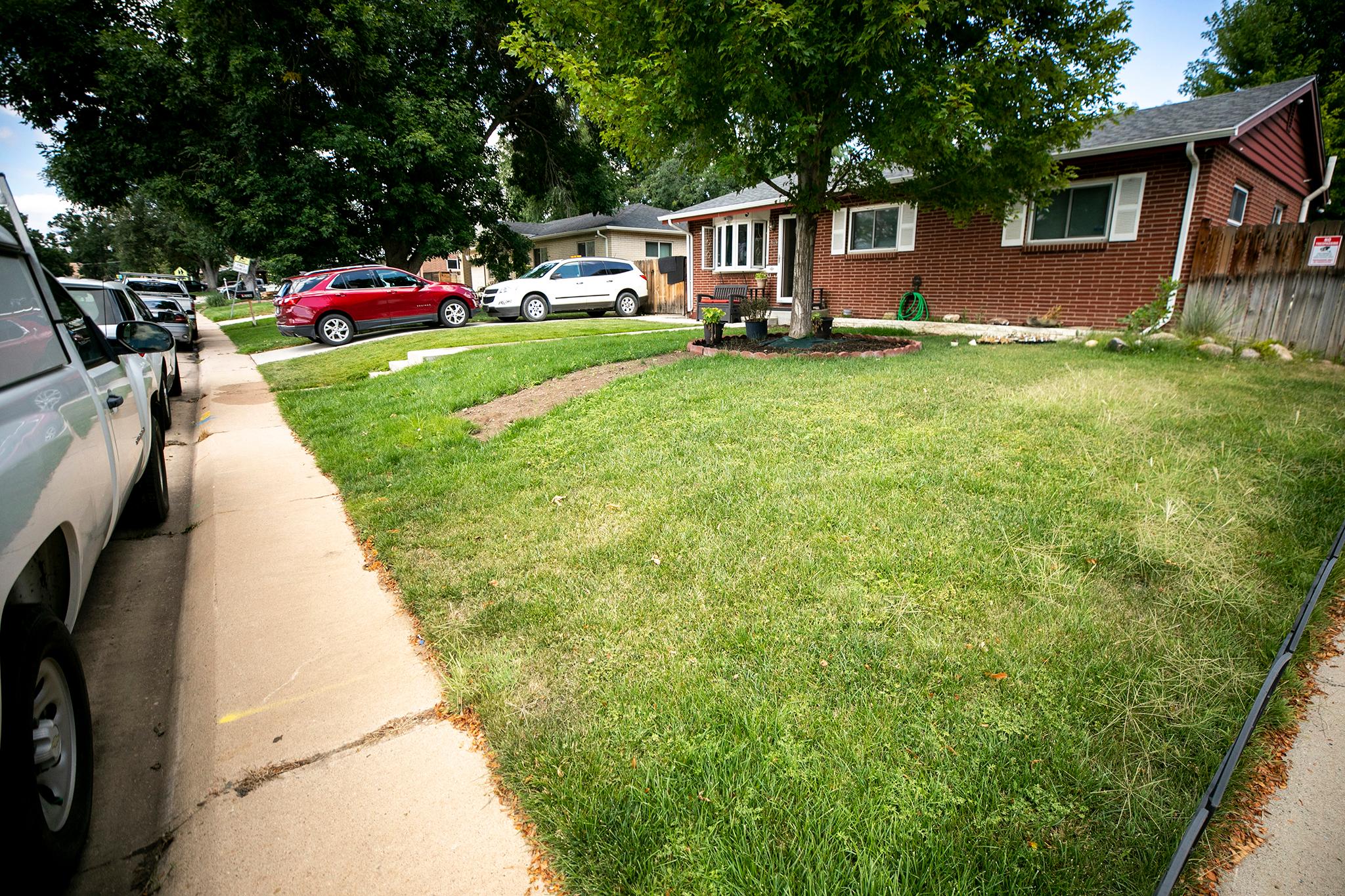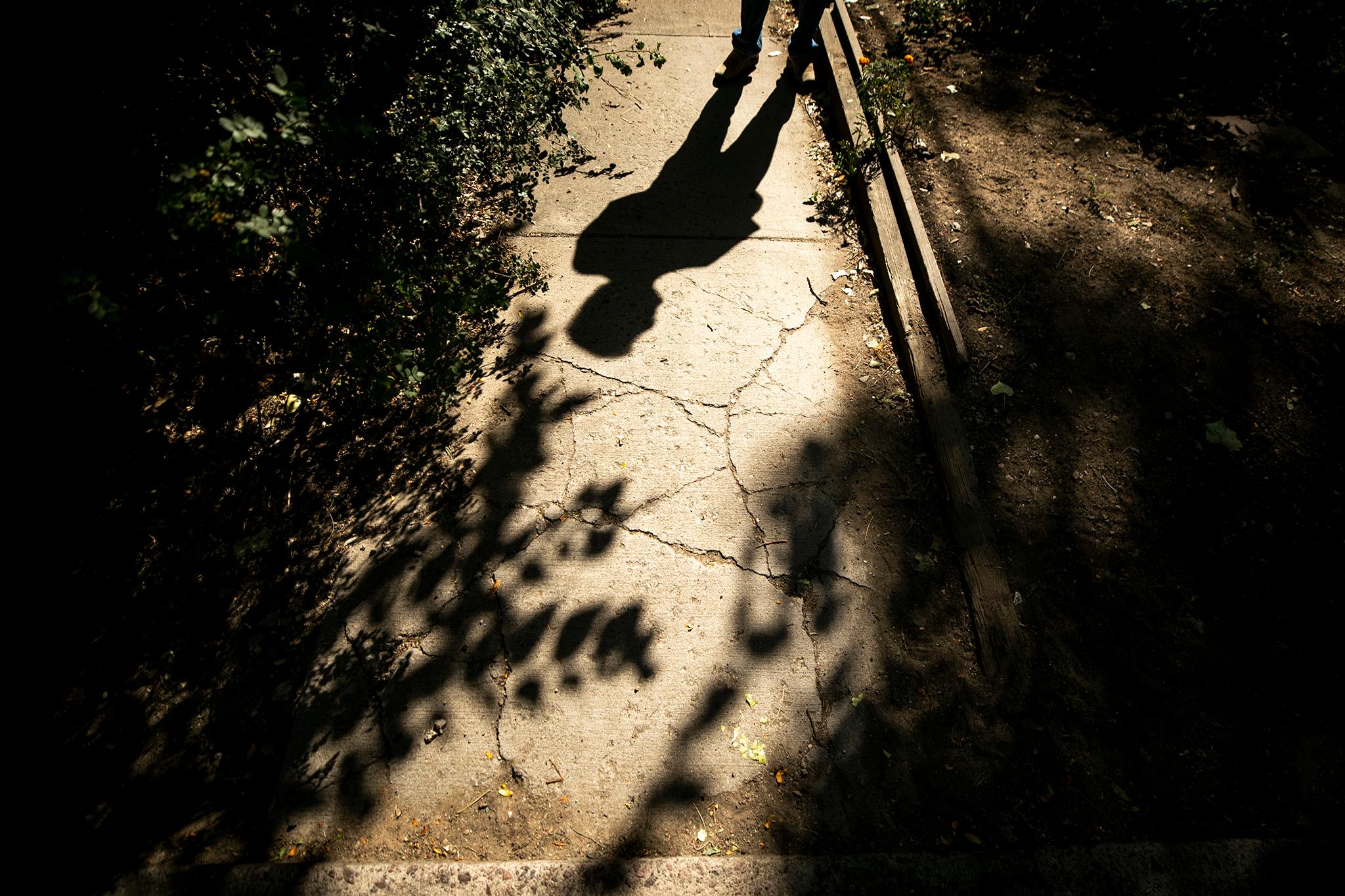Larry Leszczynski and Anne Hines live in Congress Park in a three-bedroom home on the corner of their block. Recently, they looked up what the city will charge them annually starting next year as a voter-approved effort to fix or build sidewalks gets underway.
They were surprised to learn they'll be charged $495.90 per year.
The other 11 single-family homes on the block will pay a yearly combined total of $842.82. That means Leszczynski and Hines will pay 37% of the block's total fees for single-family homes because they live on the corner of a busy street billed at a higher rate.
"I voted against that ballot measure when it came out, because I thought it was misguided," Leszczynski said. "I think that we need money to pay for this, but I don't see why it's not treated as an infrastructure thing like parks or police or fire protection, everybody benefits from it."
Before the Denver Deserves Sidewalks initiative passed in 2022, property owners were responsible for maintaining their own sidewalks as needed, but now the city will collect money annually. For advocates, it's a safety and accessibility win in a city with a number of broken and nonexistent sidewalks.
But questions remain about how long the rollout will take, how much the program will actually cost and what, if anything, to do about properties with extremely high fees.
Denver recently released a fee calculator that gives owners an estimate of what they'll pay, so we looked at the data to see what costs look like across the city.

Here's a look how fees will be spread across Denver's neighborhoods, according to preliminary city data.
One important caveat that Department of Transportation and Infrastructure (DOTI) spokesperson Nancy Kuhn pointed out is that individual estimates available in the city's online calculator are subject to change as they work this all out and fix any potential errors with individual values (property owners who believe there are errors with their fee can request a review online).
Homes in Neighborhood Equity & Stabilization (NEST) neighborhoods will receive a 20% fee discount, which we took into account when looking at costs.
City data shows that southeast and far southwest neighborhoods were quoted higher than their neighbors. Homeowners in places like Hampden, Hilltop and Belcaro were quoted, on average, more than $200 annually for their sidewalks. Southmoor Park came out with the highest average cost: about $280 each year.
Central neighborhoods came in with the lowest averages. Lincoln Park's average came in at about $74 per year, an $18 drop after NEST discounts were applied. 17 neighborhoods benefitted from NEST assistance, lopping off $50 off average costs for Windsor, $36 off average costs for Montbello and $31 off average costs for Globeville, to name a few.

Only 15% of property owners will pay fees between $200 and $400.
Around half of single-family homeowners in the city will pay between $100 and $200 per year. Some 250 homes will pay more than $800 in fees, and around 1,000 homes will pay less than $50.
Wash Park's Gart Family Mansion, owned by the sports-retail dynasty, has a fee of $2,994.61 per year for the home at 300 S. York St. -- the highest according to the city's calculator. The Governor's Mansion at 400 8th Ave., now used as an event space run by the state, will pay $2,699.26 per year.

And while many of the top fees belong to massive buildings worth millions of dollars, a small number of property owners with homes that are not mansions will end up paying fees into the hundreds, like Leszczynski and Hines in Congress Park.
"I'm sure for some people, it's going to be a hardship," Leszczynski said. "For us luckily it's not a financial hardship, but it just doesn't seem fair."

High costs for a small group of property owners is a problem critics of the ballot measure warned about during the November 2022 election.
When campaigning for the ballot initiative, supporters of the program said that the city would figure out workarounds for situations where the fee seemed "unreasonable." But what those tweaks might look like, or what would be considered an egregious fee, is still unknown.
Jill Locantore, who ran the push for the ballot initiative and is on Denver's task force to roll out the sidewalks initiative, said the city is still in the process of figuring out what adjustments might look like. Locantore said they plan to figure out any adjustments by December, with fees set to start in January.
"We anticipated that there would probably be some very weird edge cases where a very large fee was being applied to a property that wasn't a multi million dollar property," she said. "Now that's exactly the kind of thing that committee we'll be discussing. How do we ensure that the fee truly is reasonable in the way that it was applied?"

Another question is how governmental agencies, like the city, state and Denver Public Schools, will budget for the fee.
Under the previous system, governmental agencies would pay for sidewalk repairs as needed, like private property owners. Now they are also responsible for paying the annual fee.
Kuhn said the city of Denver is currently estimated to bill itself $1.7 million in sidewalk fees.
"How Denver will pay its share will be established in conjunction with establishment of the enterprise fund," she said. Enterprise funds are a type of fund in the city budget used to cover things like wastewater management. Mayor Mike Johnston will release his proposed 2024 budget this month.
Denverite reached out to the Colorado Department of the Treasury and Denver Public Schools for comment on how they plan to budget for the fees but did not hear back before time of publication .
It's still unclear how long the initiative will take, or whether it will raise enough money.
Advocates for the initiative estimated it would take nine years to fix and build city sidewalks, funded by $40 million in revenue bonded into $850 million to cover costs. But a city analysis found that the project could have a $7.3 billion shortfall, and take around 27.5 years. The city is currently engaging a third party to analyze the full cost and timeline for the program.
In the meantime, some city officials want Denver to delay the roll out of the program until the cost and timeline are clear. Councilmember Amanda Sawyer said she questions whether the city has enough contractors and construction material to upgrade city sidewalks in a timely manner.
"Voters of the city of Denver said that they want sidewalks, and they want to implement a fee and essentially charge ourselves for sidewalks, and I support that 100%. The devil is in the details," Sawyer said. "I don't think it's fair for our residents to get charged, when we don't know exactly what changes need to be made to this ordinance in order to make it implementable."
Kuhn said that contracting might be an issue. "We do have concerns about capacity in terms of available contractors, concrete and labor and it's something we're currently evaluating," she said.
To Locantore, Denver has already delayed the roll out; voters approved the initiative in the fall of 2022, but the city will not collect fees until 2024. She said the city will figure out tweaks to the program and know the timeline before fees start, but did not have a clear date for when that would happen.
"If it's December and we're still like, 'We have no idea how this was gonna work out,' then it might be time to consider a pause," Locantore said. "But I think it would be good to allow the committee to do its work and see where we get over the next couple of months."

Until the program really gets off the ground, sidewalk repairs across the city may be delayed in the short term.
In Congress Park, Hines said she has talked with neighbors who feel disincentivized from taking care of their sidewalks since they are paying the fee. Hines and Leszczynski feel that way as well. A few years ago, they spent around $500 to fix a broken piece of sidewalk next to their alley. But they said trash trucks cut the corner to avoid a telephone pole, immediately breaking up the sidewalk piece again.
Locatore said she thinks the program can deliver in a reasonable timeline. But she said that relies on it bringing in enough revenue.
"At the end of the day, you know, we need to make sure that we're balancing fairness with actually having a workable program, and if it's not generating enough revenue, and we're creating an unfunded liability for the city," she said. "That's a big problem too."
Have thoughts about your sidewalk fee? Drop me a line at [email protected].
Denverite reporter Kevin Beaty contributed reporting.
Editor's note: The map in this story has been updated to correctly point to the Lincoln Park neighborhood. Leszczynski and Hines' fee has also been corrected with the total amount listed in the city's fee calculator.













